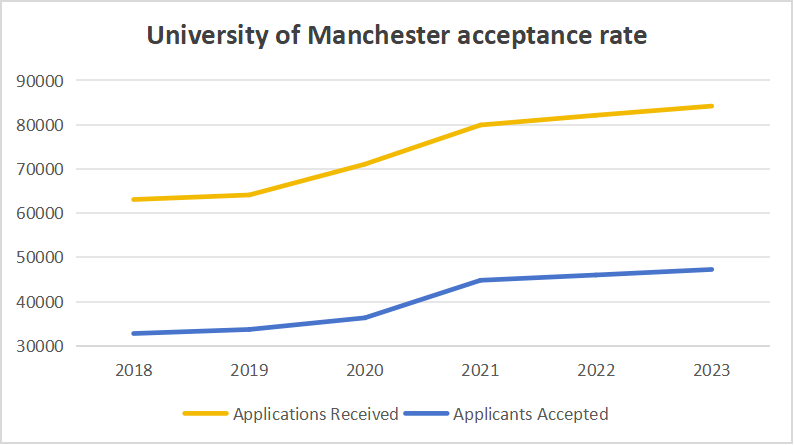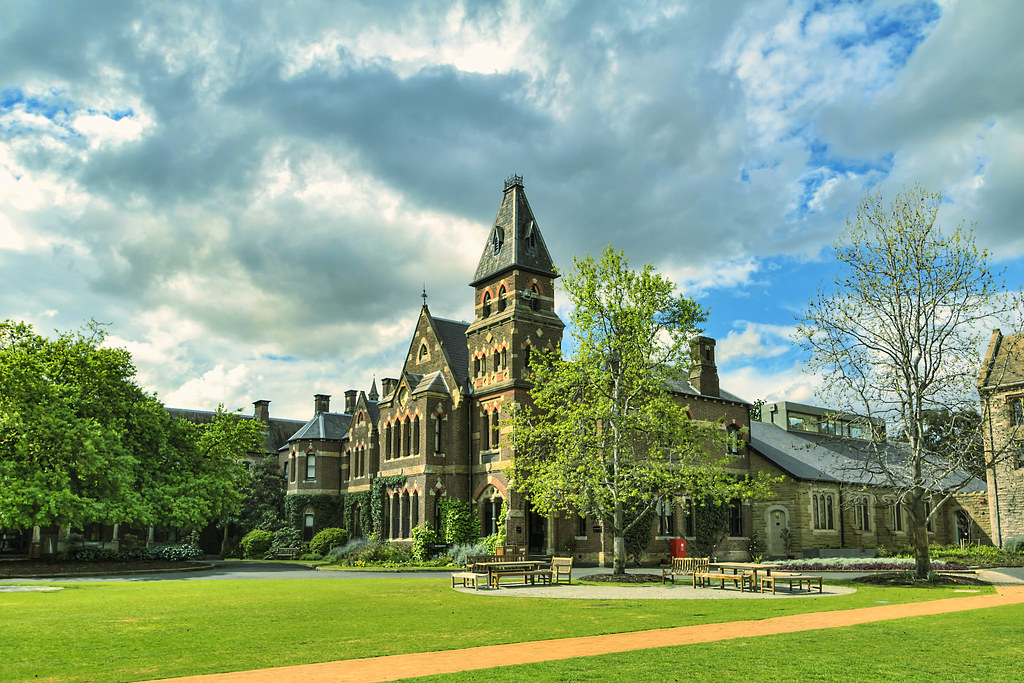The University of Manchester is renowned for its academic excellence and vibrant city life, attracting thousands of ambitious students every year. However, applying to the University of Manchester is highly competitive. This guide aims to demystify the University of Manchester’s acceptance rates, explore the factors that affect your chances of being accepted, provide valuable insights into the admissions process and offer practical tips to strengthen your application. Whether you are a prospective undergraduate or postgraduate student, understanding acceptance rates and the factors that influence them is crucial to a successful application.
Overall University of Manchester Acceptance Rate
Undergraduate
51%
Postgraduate
35%
The University of Manchester has an average acceptance rate of 40%-50%. In 2024, over 44,000 students are studying here, including over 10,000 international students from over 160 countries. This reflects the University’s philosophy of actively building an international atmosphere while still maintaining rigorous admission standards.
| Details | Headcount |
|---|---|
| Total students | 44,000 |
| International students | 25% |
| Undergraduate students | 65% |
| Postgraduate students | 35% |
University of Manchester Acceptance Rate History
The data below demonstrates the evolution of the University of Manchester’s acceptance rate over the last six years. The number of applications and admissions has continued to rise since 2018, reflecting the global student recognition of the quality of teaching at the University of Manchester.
| Year | 2018 | 2019 | 2020 | 2021 | 2022 | 2023 |
|---|---|---|---|---|---|---|
| Applications Received | 63072 | 64101 | 71063 | 79925 | 82135 | 84210 |
| Applicants Accepted | 32760 | 33677 | 36306 | 44800 | 46000 | 47250 |
| Acceptance Rate | 51.9% | 52.5% | 51.1% | 56.1% | 56.0% | 56.1% |

Acceptance Rates by Subject
Admission requirements vary for each faculty and specialism at the University of Manchester, and popular specialisms tend to have more applicants, resulting in relatively lower acceptance rates. Overall, programmes such as Medicine, Dentistry and Business are the most competitive, while Classics, Linguistics and Philosophy related programmes are more likely to be accepted.
| Most Competitive Subjects | |
|---|---|
| Programme | Offer Rate |
| Medicine and Dentistry | 25% |
| Subjects allied to Medicine | 39% |
| Business and Admin studies | 47% |
| Architecture, Building and Planning | 52% |
| Computer Sciences | 59% |
| General other combined & unknown | 59% |
| Creative Arts and Design | 60% |
| Non-European Langs and related | 71% |
| Engineering | 71% |
| Least Competitive Subjects | |
|---|---|
| Programmes | Offer Rate |
| Linguistics, Classics and related | 91% |
| History and Philosophical studies | 87% |
| Education | 84% |
| European Languages, Literature and related | 83% |
| Physical Sciences | 83% |
| Mathematical Sciences | 76% |
| Social Studies | 76% |
| Biological Sciences | 75% |
| Combined arts, social sciences and sciences | 73% |
Noteworthy Courses
Applying for medical-related courses is difficult: Medicine and medicine-related courses are among the most competitive at the University of Manchester, renowned for their world-class teaching and research, rich clinical practice opportunities, personalised study pathways and close collaboration with the NHS. The University of Manchester’s medical programme is not only rigorous, but also very small, with only 2,200 undergraduate students enrolled in the entire medical school.
Linguistics, Classics and Philosophy programmes are the least competitive: The number of students choosing linguistics, classics and philosophy is relatively small compared to popular majors such as computer science and business. This makes the competitive pressure in these majors likely to be slightly lower than in popular majors. In addition, these liberal arts majors tend to be more flexible in their curriculum with many sub-divisions of specialisation, indirectly reducing the difficulty of applying to each programme.
University of Manchester Acceptance Rates for International Students
The University of Manchester has long been known for its diverse student body composition and inclusive community and has one of the highest numbers of international students in the UK. By 2024, there were over 10,000 international students within the University of Manchester, more than 25% of the total student population. Therefore for international students, applying to the University of Manchester is an option worth considering.
Local students vs. International students
Generally speaking, international students need to face more challenges than local students when applying to the University of Manchester, and this is reflected in a number of ways, such as the need for IELTS test scores, more expensive tuition fees, or a non-recognised education system in their home country. Additionally, when applying for high-demand specialisms such as medicine and engineering, fewer places may be allocated to international applicants, further increasing competition. However, in subjects that emphasise a more global outlook, such as business and humanities, the University of Manchester actively recruits students from abroad to enrich its global diversity, resulting in a similar acceptance rate for international students as for domestic applicants.
Regions for International Applicants
The University of Manchester is home to students from over 160 different countries, with the largest international student body of over 8,000 Chinese students. In the 2022-23 intake cycle, the largest international student groups are from countries such as China, Malaysia, India, UAE and Saudi Arabia.
| Admission Statistics 2022-23 | |
|---|---|
| Country | Headcount |
| China | 1624 |
| Malaysia | 244 |
| India | 196 |
| UAE | 73 |
| Saudi Arabia | 63 |
Factors Affecting Acceptance Trends
The admission criteria for the University of Manchester are not set in stone, and its acceptance rate can be affected by a variety of factors. If you are targeting the University of Manchester, it is worth knowing these factors in advance to better prepare for future applications.
- Increased global competition: As many UK universities continue to strengthen their international reputations, it is inevitable that the top-ranked University of Manchester will be targeted by more people for study. In particular, specialisms such as finance, computing and management, which are popular with international students, may be affected, resulting in lower acceptance rates.
- Changes in university/national policy: Changes in the number of applications are likely to result from both changes in university tuition fees and visa requirements in the U.K. In 2025, tuition fees at the University of Manchester will continue to rise to an average of £30,000 per year. In addition, there is news that the UK government is considering cancelling the Post-Study Work visa (PSW), a visa that can greatly assist international students in obtaining work. All of these factors could lead to a drop in the number of applicants to the University of Manchester, which in turn could increase the acceptance rate.
- Economic factors: Changes in the global economy, including rising costs of higher education and changes in funding for international students, may affect the number of applicants. Countries with declining economies may send fewer students abroad, while students from countries with strong economies may find it easier to apply to and attend a prestigious university such as Manchester.
Get the Best Student Accommodation near University of Manchester
Planning to start your study abroad journey at the University of Manchester? uhomes.com offers you a safe, stylish and stress-free student living experience! We specialise in providing high-quality, purpose-built accommodation just minutes away from campus, designed to enhance the quality of your academic life while prioritising comfort and convenience. Whether you crave a quiet space to study, a vibrant social atmosphere or easy access to Manchester’s iconic cultural venues, uhomes.com has the perfect accommodation for you. Browse our selection of student accommodation near University of Manchester today and enjoy carefree living in one of the UK’s most vibrant cities.
How to Increase Your Success Rate
Improve academic performance
- Maintain a high GPA: This is the most basic requirement. The higher the GPA, the more you can prove your academic ability.
- Choose courses related to the field you are applying for: If you want to apply for a business course, it will be more convincing if you have grades in economics, accounting, management, etc. Some majors may require grades in related fields. Some programmes may require grades in related fields.
- Participate in research projects or internships: These experiences can demonstrate your academic and practical skills.
Improvement of language skills
- IELTS/TOEFL: Achieving the language scores required by the University of Manchester is a basic requirement.
- Practise your English writing and speaking skills: When preparing your personal statement, you need to express yourself clearly in English. In addition, interviews may be required for some of the most popular courses, and good speaking skills will enable you to introduce yourself more fluently.
Polish your personal statement
- Highlight your personal strengths: Highlight your academic achievements, research experiences, internships, social activities, etc., to show what makes you unique.
- Demonstrate your passion for the subject: Show why you chose this subject and what you know about it.
- Demonstrate fit with the university: highlight what attracted you to Manchester University and how you can contribute to the university.
Prepare high-quality recommendation letters
- Choose the right recommender: Ask a professor or mentor who is familiar with your academic ability and personal qualities to write a recommendation letter for you.
- Communicate with your recommenders in advance: Provide them with the information they need, such as your resume, transcripts, and personal statement.
Prepare for the interview (if required)
- Know the format of the interview: Know in advance whether the interview will be a group or one-on-one interview.
- Prepare common questions: Prepare common interview questions in advance, such as ‘Why did you choose this major?’ and ‘What are your strengths?
- Demonstrate confidence and enthusiasm: Be confident and express yourself positively during the interview.
Other recommendations
- Start preparing as early as possible: the application process takes time, and the earlier you prepare, the better.
- Understand the admission requirements of the university: Read the admission information on the official website of the University of Manchester carefully to clarify the application requirements.
- Participate in online and offline activities: Learn about the academic atmosphere and campus culture.
Conclusion
The University of Manchester offers a world-class education, and while acceptance rates are competitive, they are not insurmountable. By focusing on academic excellence, crafting a strong application and demonstrating your unique qualities, you can greatly increase your chances of joining this esteemed institution. Remember, every successful application begins with a solid foundation of hard work and dedication.
FAQ
Is it difficult to get into University of Manchester?
Yes, getting into the University of Manchester can be difficult. The overall acceptance rate at the University hovers around 50 per cent, indicating a degree of selectivity. Certain majors, such as medicine, dentistry and some popular fields, are highly competitive and have lower acceptance rates. However, by focusing on academic excellence, building a strong application package and demonstrating your unique qualities, you can greatly increase your chances of being accepted.
What is the acceptance rate for University of Manchester?
Acceptance rates at the University of Manchester fluctuate, but are generally in the 40-50%. However, it should be noted that the acceptance rate varies considerably from one speciality to another, with lower acceptance rates for highly competitive specialities such as Medicine and Dentistry.
How prestigious is the University of Manchester?
The University of Manchester is recognised as one of the most prestigious universities in the UK and globally. It is consistently ranked among the top universities in the world. The University of Manchester is ranked in the top 30 universities in the world in the QS World University Rankings 2024 and is renowned for its research excellence, strong academic programmes and contributions to a wide range of fields. The University of Manchester is a member of the Russell Group, which represents the UK’s leading universities committed to maintaining the highest standards of research and teaching.








